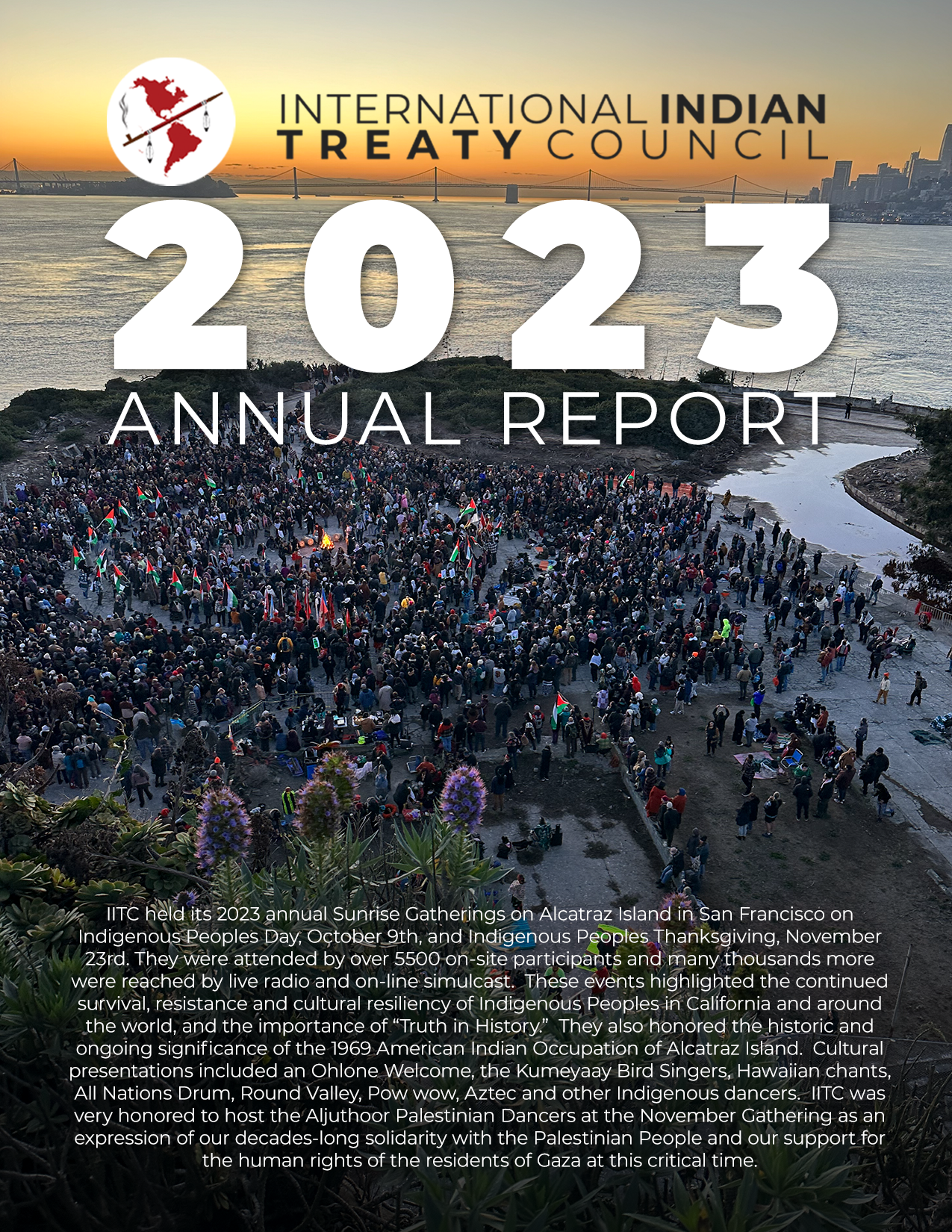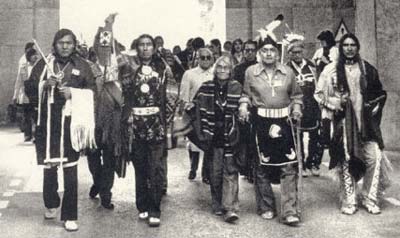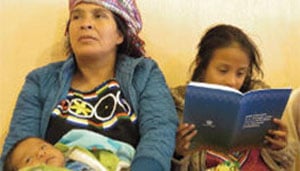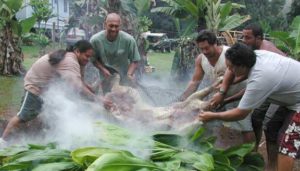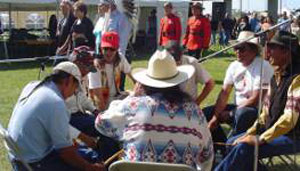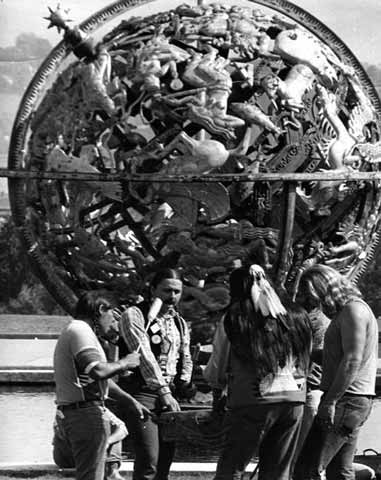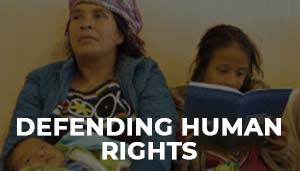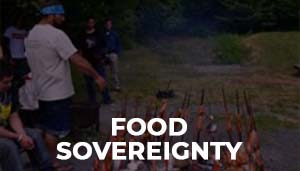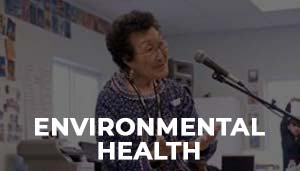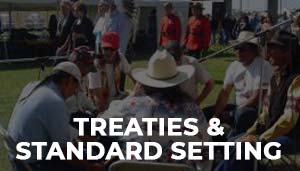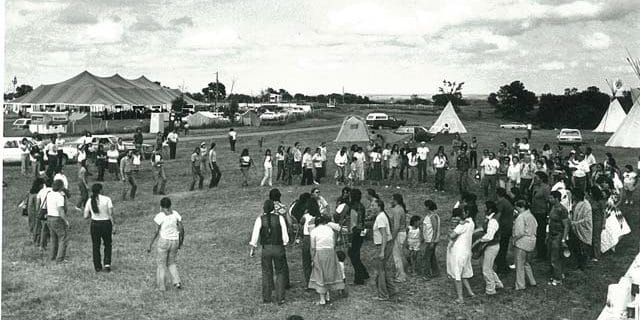Final: International Indian Treaty Council Statement of Support for the Recommendations of the UN Permanent Forum, the UN Special Rapporteur on the Rights of Indigenous Peoples and the UN Expert Mechanism on the Rights of Indigenous Peoples Addressing the Matter of “Local Communities”
Presented on June 24, 2022, during the 4th meeting of the Open-ended Working Group on the Post-2020 Global Biodiversity Framework, Nairobi Kenya
The International Indian Treaty Council (IITC), an organization of Indigenous Peoples of North America, Central America, South America, the Caribbean and the Pacific working for the sovereignty and self-determination of Indigenous Peoples and the recognition and protection of Indigenous rights, Treaties, traditional cultures and Sacred Lands. IITC was founded in 1974; it is the first Indigenous organization to receive ECOSOC Consultative Status in 1977. In 2011 IITC was upgraded by ECOSOC to be the first Indigenous People’s organization with General Consultative Status.
Representatives of the IITC have participated in the meetings of the Convention on Biodiversity, the Article 8j Working Group, the development of the Nagoya Protocols and in the International Indigenous Peoples Forum on Biodiversity for over two decades, although we stepped back from participating in the most recent years for various reasons. However our affiliates, Indigenous Peoples, Nations, networks and organizations from 4 UN regions (Latin America/Caribbean, North America, Arctic and Pacific) called upon us to reengage over the past three years due to the importance of the post 2020-framework now under development as well as their growing concerns with positions taken by the IIPFB to combine and equate recognition of the rights of Indigenous Peoples, in particular our affirmed rights to lands and territories and Free Prior and Informed Consent (FPIC) with those of a still undefined constituency called “Local Communities”.
Combining these two distinct constituencies into a non-existent entity referred to as “IPLC” and then attributing rights to this entity that are recognized internationally specifically for Indigenous Peoples as distinct, self-determining Peoples is very troubling to many Indigenous Peoples as well as to the UN bodies that are specifically mandated to address and uphold the rights of Indigenous Peoples.
These inherent and recognized rights, among many others, are affirmed in the UN Declaration on the Rights of Indigenous Peoples adopted by the UN General Assembly in 2007. In our view, extending them to an undefined entity called “Local Communities” undermines their recognition and realization for Indigenous Peoples both at United Nations bodies and in our own lands and territories. The IIPFB’s opening statement and text proposals for several targets refer to rights of “IPLC”. These were developed and presented despite concerns and objections expressed by IITC in this and previous sessions. We clarify at this time to States, Indigenous Peoples and the CBD Secretariat that IITC is specifically not in agreement with the texts that conflate the rights of Indigenous Peoples with those of “local communities”.
IITC instead aligns itself with and highlights the position adopted by the consensus of the expert members of United Nations Permanent Forum on Indigenous Issues reflected in E/2022/43 E/C.19/2022/11, “Report on the 21st session (25 April to 6 May 2022) to the UN Economic and Social Council. Their recommendation, contained in paragraph 85 the report is as follows: recommended:
- Indigenous peoples have been a distinct constituency at the United Nations since 1977 and, with the adoption of the United Nations Declaration on the Rights of Indigenous Peoples by the General Assembly in 2007, their inherent rights were affirmed as the international minimum standard. The Permanent Forum reiterates the position of the Special Rapporteur on the rights of indigenous peoples, namely that it is unacceptable to undermine the status and standing of indigenous peoples by combining or equating them with non-indigenous entities such as minorities, vulnerable groups or local communities. Such attempts, whether by States or United Nations entities, are not acceptable and will be challenged by indigenous peoples and those mandated to defend their rights. The Permanent Forum urges all United Nations entities and States parties to treaties concerning the environment, biodiversity and the climate to eliminate the use of the term “local communities” in conjunction with indigenous peoples, so that the term “indigenous peoples and local communities” would be abolished.
We also call attention to recommendations in paragraphs 86 and 87 which are relevant to the rights of Indigenous Peoples as they relate to the issue of biodiversity.
The UNPFII recommendation references the position of UN Special Rapporteur on the Rights of Indigenous Peoples Francisco Cali Tzay on March 24th, 2022, addressing attempts by some States at 4th COP of the Minamata Convention on Mercury to combine Indigenous Peoples with Local Communities in that UN Convention process as follows:
“Indigenous Peoples have been a distinct constituency at the United Nations since 1977. They were recognized at the UN Earth Summit in 1992 as a one of the stand-alone Major Groups with their own voice and representation in UN bodies addressing environment and sustainable development. With the adoption of the UN Declaration on the Rights of Indigenous Peoples by the UN General Assembly in 2007, their inherent rights were affirmed as the international minimum standard. Therefor we cannot accept any attempts to diminish the outcomes of this historic trajectory or undermine their status and standing by combining or equating them with non-Indigenous entities such as minorities, vulnerable groups or local communities. Such attempts, whether by States or UN bodies themselves, are not acceptable and will be challenged by Indigenous Peoples and those mandated to defend their rights.”
Finally, we note the 2021 report of the UN Expert Mechanism on the Rights of Indigenous Peoples to the 48th session of the UN Human Rights Council, “Efforts to Implement the UN Declaration on the Rights of Indigenous Peoples”, A/HCR/48/75. Paragraph 34 states: “one of the concerns expressed by some indigenous peoples is the tendency to lump indigenous peoples together with “local communities” within multiple international conventions and other multilateral agreements. This development may have the impact of undermining indigenous peoples’ rights under the Declaration, in particular their right to self-determination, a concern shared by some States.”
The IITC affirms, respects and agrees with the stated positions of these bodies of the United Nations System that are mandated to monitor compliance with the rights of Indigenous Peoples, in particular regarding respect for and implementation of the UN Declaration on the Rights of Indigenous Peoples, and to advise states and bodies in the UN system in this regard. We also support the concerns expressed by growing numbers of Indigenous Peoples who find that states are using this conflation of rights and identity to undermine their rights to lands, territories, resources and FPIC on the ground in their own homelands.
We therefore call upon all Parties to the Convention on Biological Diversity to implement recommendation 85 of the Final Report of the 21st session of the UN Permanent Forum and to take into account the relevant positions of the UN Special Rapporteur as well as the EMRIP in their deliberations here and at CBD COP 15 in Montreal in December 2022.
We emphasize that we are not opposing any groups or entities that self-identify as “local communities”, their current or future participation in the CBD process, or their efforts in the future to attain recognition of their rights.
We note opposition to any actions or texts that could undermine the United Nations Declaration on the Rights of Indigenous Peoples by combining or conflating Indigenous Peoples’ recognized rights with those of “local communities”. We agree that the term “IPLC” should be abolished from the terminology used by the CBD and other UN bodies.
IITC will not be complicit in actions that have the effect of undermining the rights of Indigenous Peoples and will not agree to any decisions that fall below the internationally recognized “minimum standards for the dignity, survival and wellbeing of Indigenous Peoples, now and in the future. Separating the bodies, representation, and texts addressing “Local Communities” in relation to the CBD and the Post 2020 Framework from those pertaining to Indigenous Peoples will safeguard the rights of Indigenous Peoples. This will also allow self-identified “local communities” to define and organize their own processes, express their own concerns, and develop their own voices for their effective participation in this process.
In closing, IITC confirms that we will continue to participate in the IIFB and CBD processes and will work with all participants to ensure that the CBD’s post 2020 framework fully respects the rights, participation and knowledge of Indigenous Peoples as essential for the protection of biodiversity.
Statement endorsed by Coordinator of Indigenous Organization of the Amazon Basin – COICA-, https://coicamazonia.org/logos-coica/
Share this post
IITC Statement of Support for UN Recommendations Addressing the Matter of “Local Communities”
Final: International Indian Treaty Council Statement of Support for the Recommendations of the UN Permanent Forum, the UN Special Rapporteur on the Rights of Indigenous Peoples and the UN Expert Mechanism on the Rights of Indigenous Peoples Addressing the Matter of “Local Communities”
Presented on June 24, 2022, during the 4th meeting of the Open-ended Working Group on the Post-2020 Global Biodiversity Framework, Nairobi Kenya
The International Indian Treaty Council (IITC), an organization of Indigenous Peoples of North America, Central America, South America, the Caribbean and the Pacific working for the sovereignty and self-determination of Indigenous Peoples and the recognition and protection of Indigenous rights, Treaties, traditional cultures and Sacred Lands. IITC was founded in 1974; it is the first Indigenous organization to receive ECOSOC Consultative Status in 1977. In 2011 IITC was upgraded by ECOSOC to be the first Indigenous People’s organization with General Consultative Status.
Representatives of the IITC have participated in the meetings of the Convention on Biodiversity, the Article 8j Working Group, the development of the Nagoya Protocols and in the International Indigenous Peoples Forum on Biodiversity for over two decades, although we stepped back from participating in the most recent years for various reasons. However our affiliates, Indigenous Peoples, Nations, networks and organizations from 4 UN regions (Latin America/Caribbean, North America, Arctic and Pacific) called upon us to reengage over the past three years due to the importance of the post 2020-framework now under development as well as their growing concerns with positions taken by the IIPFB to combine and equate recognition of the rights of Indigenous Peoples, in particular our affirmed rights to lands and territories and Free Prior and Informed Consent (FPIC) with those of a still undefined constituency called “Local Communities”.
Combining these two distinct constituencies into a non-existent entity referred to as “IPLC” and then attributing rights to this entity that are recognized internationally specifically for Indigenous Peoples as distinct, self-determining Peoples is very troubling to many Indigenous Peoples as well as to the UN bodies that are specifically mandated to address and uphold the rights of Indigenous Peoples.
These inherent and recognized rights, among many others, are affirmed in the UN Declaration on the Rights of Indigenous Peoples adopted by the UN General Assembly in 2007. In our view, extending them to an undefined entity called “Local Communities” undermines their recognition and realization for Indigenous Peoples both at United Nations bodies and in our own lands and territories. The IIPFB’s opening statement and text proposals for several targets refer to rights of “IPLC”. These were developed and presented despite concerns and objections expressed by IITC in this and previous sessions. We clarify at this time to States, Indigenous Peoples and the CBD Secretariat that IITC is specifically not in agreement with the texts that conflate the rights of Indigenous Peoples with those of “local communities”.
IITC instead aligns itself with and highlights the position adopted by the consensus of the expert members of United Nations Permanent Forum on Indigenous Issues reflected in E/2022/43 E/C.19/2022/11, “Report on the 21st session (25 April to 6 May 2022) to the UN Economic and Social Council. Their recommendation, contained in paragraph 85 the report is as follows: recommended:
- Indigenous peoples have been a distinct constituency at the United Nations since 1977 and, with the adoption of the United Nations Declaration on the Rights of Indigenous Peoples by the General Assembly in 2007, their inherent rights were affirmed as the international minimum standard. The Permanent Forum reiterates the position of the Special Rapporteur on the rights of indigenous peoples, namely that it is unacceptable to undermine the status and standing of indigenous peoples by combining or equating them with non-indigenous entities such as minorities, vulnerable groups or local communities. Such attempts, whether by States or United Nations entities, are not acceptable and will be challenged by indigenous peoples and those mandated to defend their rights. The Permanent Forum urges all United Nations entities and States parties to treaties concerning the environment, biodiversity and the climate to eliminate the use of the term “local communities” in conjunction with indigenous peoples, so that the term “indigenous peoples and local communities” would be abolished.
We also call attention to recommendations in paragraphs 86 and 87 which are relevant to the rights of Indigenous Peoples as they relate to the issue of biodiversity.
The UNPFII recommendation references the position of UN Special Rapporteur on the Rights of Indigenous Peoples Francisco Cali Tzay on March 24th, 2022, addressing attempts by some States at 4th COP of the Minamata Convention on Mercury to combine Indigenous Peoples with Local Communities in that UN Convention process as follows:
“Indigenous Peoples have been a distinct constituency at the United Nations since 1977. They were recognized at the UN Earth Summit in 1992 as a one of the stand-alone Major Groups with their own voice and representation in UN bodies addressing environment and sustainable development. With the adoption of the UN Declaration on the Rights of Indigenous Peoples by the UN General Assembly in 2007, their inherent rights were affirmed as the international minimum standard. Therefor we cannot accept any attempts to diminish the outcomes of this historic trajectory or undermine their status and standing by combining or equating them with non-Indigenous entities such as minorities, vulnerable groups or local communities. Such attempts, whether by States or UN bodies themselves, are not acceptable and will be challenged by Indigenous Peoples and those mandated to defend their rights.”
Finally, we note the 2021 report of the UN Expert Mechanism on the Rights of Indigenous Peoples to the 48th session of the UN Human Rights Council, “Efforts to Implement the UN Declaration on the Rights of Indigenous Peoples”, A/HCR/48/75. Paragraph 34 states: “one of the concerns expressed by some indigenous peoples is the tendency to lump indigenous peoples together with “local communities” within multiple international conventions and other multilateral agreements. This development may have the impact of undermining indigenous peoples’ rights under the Declaration, in particular their right to self-determination, a concern shared by some States.”
The IITC affirms, respects and agrees with the stated positions of these bodies of the United Nations System that are mandated to monitor compliance with the rights of Indigenous Peoples, in particular regarding respect for and implementation of the UN Declaration on the Rights of Indigenous Peoples, and to advise states and bodies in the UN system in this regard. We also support the concerns expressed by growing numbers of Indigenous Peoples who find that states are using this conflation of rights and identity to undermine their rights to lands, territories, resources and FPIC on the ground in their own homelands.
We therefore call upon all Parties to the Convention on Biological Diversity to implement recommendation 85 of the Final Report of the 21st session of the UN Permanent Forum and to take into account the relevant positions of the UN Special Rapporteur as well as the EMRIP in their deliberations here and at CBD COP 15 in Montreal in December 2022.
We emphasize that we are not opposing any groups or entities that self-identify as “local communities”, their current or future participation in the CBD process, or their efforts in the future to attain recognition of their rights.
We note opposition to any actions or texts that could undermine the United Nations Declaration on the Rights of Indigenous Peoples by combining or conflating Indigenous Peoples’ recognized rights with those of “local communities”. We agree that the term “IPLC” should be abolished from the terminology used by the CBD and other UN bodies.
IITC will not be complicit in actions that have the effect of undermining the rights of Indigenous Peoples and will not agree to any decisions that fall below the internationally recognized “minimum standards for the dignity, survival and wellbeing of Indigenous Peoples, now and in the future. Separating the bodies, representation, and texts addressing “Local Communities” in relation to the CBD and the Post 2020 Framework from those pertaining to Indigenous Peoples will safeguard the rights of Indigenous Peoples. This will also allow self-identified “local communities” to define and organize their own processes, express their own concerns, and develop their own voices for their effective participation in this process.
In closing, IITC confirms that we will continue to participate in the IIFB and CBD processes and will work with all participants to ensure that the CBD’s post 2020 framework fully respects the rights, participation and knowledge of Indigenous Peoples as essential for the protection of biodiversity.
Statement endorsed by Coordinator of Indigenous Organization of the Amazon Basin – COICA-, https://coicamazonia.org/logos-coica/
